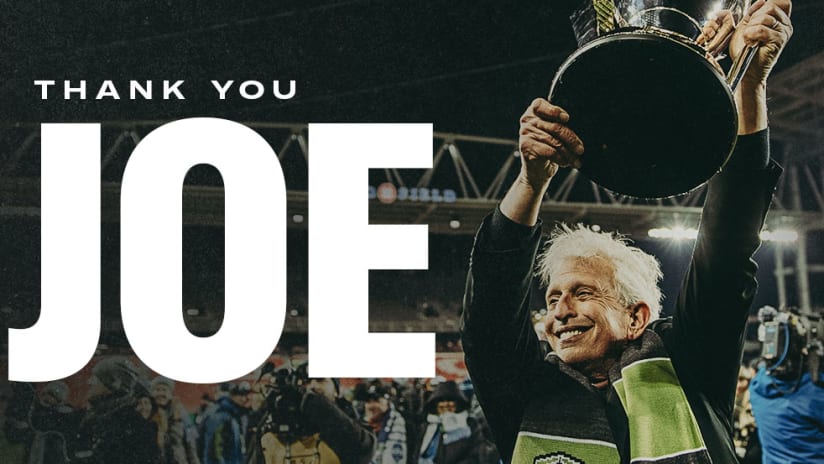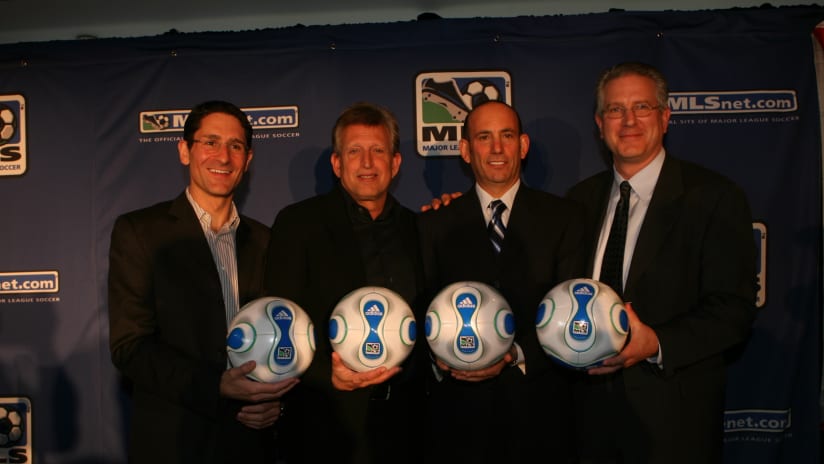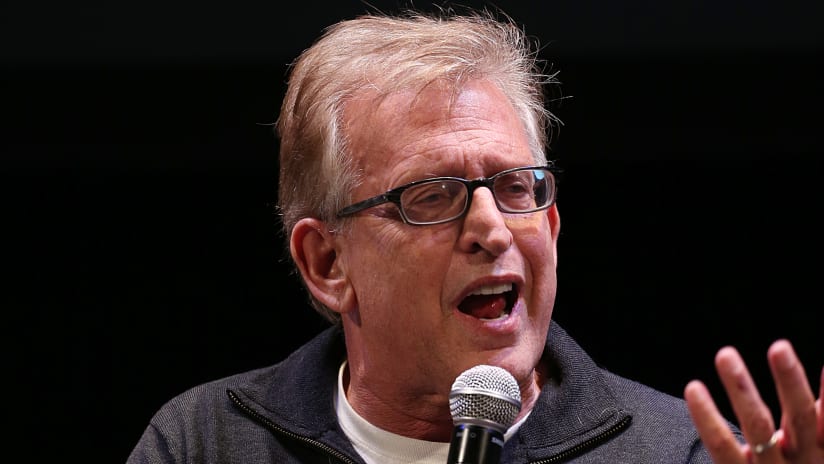It was a marathon. It was a sprint. The Russians started it and Joe Roth finished it.
It was a marathon. It was a sprint.
The Russians started it and Joe Roth finished it.
And for the 14 years in between, Fred Mendoza made sure that when Major League Soccer arrived, Seattle would provide the perfect home.
Dozens of individuals dutifully carried the torch for bringing back big-time professional soccer to the Emerald City. Some were volunteers, some were billionaires, and in the end everyone played a part.
So before the agenda shifts completely toward the team’s future and opening night in 2009, it seems fitting to remember how and who got us here.
In the Beginning
“It seems like a hundred years ago now,” said longtime Seattle Pacific coach Cliff McCrath, referring to the initial MLS Seattle drive in 1994. McCrath, the bid committee’s co-chair, recalled times when Seattle’s hopes were all but dead.
“We came back from a flatline but really it was more like hibernation. And now we’re alive again.”
The evolution of this endeavor began on Jan. 29, 1994. With minimal promotion, a game between the United States and Russia attracted over 43,000 fans to the Kingdome.
At the time, it was the fifth-largest gate on American soil for an international friendly, and it prompted the U.S. Soccer powers to ask that Seattle submit a bid for an MLS charter franchise. Still, it was an effort which would be bucking formidable odds.
Seattle was entering the fray more than a month after the 30 other contending cities, and it was virtually empty-handed when it came to the MLS primary prerequisites: paid deposits for season tickets and suitable stadiums, both interim and long-term. All the while the clock would be ticking because the bids were due in only three months.
“Blindly, we thought we had a great chance,” recalls Yogi Hutsen, the other bid committee co-chair. “My goodness, this is such a major soccer community. But obviously we needed to develop plans for a stadium.”
Answering the Call
Little did Mendoza realize that when he volunteered to help the bid committee, it would, in effect, become a 15-year personal commitment. Answering the Sports & Events Council of Seattle/King County’s call to arms, Mendoza was one of 40 to attend a community meeting just days after the USA-Russia match.
Washington State Youth Soccer Association officials operated a command post, and the volunteers split into groups targeting ticket sales and the stadium search. Mendoza chose the latter.
“We looked at virtually every plot of land or existing facility to see if it could accommodate a soccer specific stadium,” Mendoza said. Name a local venue and he visited it. Thousands of acres of undeveloped land were examined. None was a quick fix.
Meanwhile, the MLS proved a hard sale. It was little more than a logo and a vision at the time. Complicating matters, the Sounders had resurfaced 11 years after the NASL franchise folded. They, too, were selling tickets.
The MLS drive managed to sell 5,000 T-shirts and netted 1,300 season ticket deposits, ranking Seattle among the leaders. However, it was not enough to offset the absence of a facility or a local sugardaddy/owner. Instead, 10 other cities were selected to begin play in 1996.
“We were all dejected,” said Hutsen, “yet all of us felt that eventually our time would come.”
Time Marches On
Whereas most communities disbanded their bid committees, Seattle’s soldiered on.
Michael Campbell, the Sports & Events Council president, endeavored to sustain the campaign’s momentum. Mendoza and the soccer stadium group remained mobilized for the next few years. They widened their search, met with public officials and explored every option. Still it added up to bupkis.
Enter Paul Allen.
Moments after haring of Allen’s campaign for a new stadium to replace the Kingdome, Campbell and Mendoza immediately sensed an opportunity to come alongside the prospective Seahawks owner in the spring of ‘97.
“We forged a relationship with Paul Allen’s people to get the stadium built,” said Mendoza, who, along with McCrath, delivered stump speeches at soccer tournaments and gatherings throughout the state as the referendum vote approached. Doug Logan, the MLS commissioner at the time, promised an expansion team if the measure passed.
“It truly was the soccer moms and dads that created the narrowest of margins,” Mendoza said, “and I know that Qwest Field would not have been built without the soccer people.”
In a perfect world, MLS would have awarded Seattle an expansion team in the days following the referendum victory. However, the two expansion slots for 1998 had already been awarded to Chicago and Miami two months earlier. As it turned out, the next round would not come around until 2005.
Pieces Fall into Place
It wasn’t clear at the time, but Seattle came very close to becoming the league’s 13th city, only to have Salt Lake prevail. Still, the pieces were beginning to fall neatly into place.
Sounders owner Adrian Hanauer and new Seahawks CEO Tod Leiweke were working in unison, welcoming high-profile international events and exhibitions, including Qwest capacity crowds to see Manchester United and Real Madrid.
And then one day last February, Joe Roth phoned MLS headquarters and landed in Seattle soon after.
“Soccer had many saviors, and Tod Leiweke was among them,” noted Mendoza, who was appointed to the Public Stadium Authority by then-Governor Gary Locke. “He was determined to keep the dream alive.”
Likewise, after announcing the MLS team’s formation Nov. 12, Leiweke credited Mendoza for being an outspoken advocate of soccer throughout his five years on the PSA.
On that idyllic day at the top of the 76-story Columbia Center, Mendoza fell on top of the world. “It was a dream I’ve had, one I’ve harbored, one that I’ve nurtured for all those years,” he said. “There were times when I wasn’t sure if it was going to happen, so on that day it was a dream come true.”
Upon hearing the news, Hutsen (now the incoming chair of the Seattle Sports Commission) was relieved more than anything else. “To have one of the top facilities in the country and all this support, how could they not? If anything, it was long overdue.”
Like the other originals, Campbell is not surprised that nearly 10,000 people have committed to buying season tickets. “How gratifying it must be for those who stepped up to the plate,” he says of the team owners. “They’ve got to be really, really validated by the response.”
Hanauer credits Roth and Leiweke for “their vision and commitment to getting the deal done quickly.” They reached the finish line, but not before taking the baton from a battalion of volunteers who gone before them.
“There are so many people who should feel proud of being the foundation upon which we build MLS in Seattle,” said Hanauer. “And there will be many more to come in the future as well.
“I think of our group as stewards of this MLS franchise, for all of the soccer people of this region, past, present, and future.”
Joe Roth
Always Pressing On, Soccer Backers Prevail

2026 Season Memberships
Feel the pull of the Sound and step into something bigger. 2026 will continue to put Seattle soccer on the world stage, so there's no better time to join the Rave Green and grow with the Sounders legacy. Secure your seat alongside the best fans in MLS. Season Memberships are on sale now.



